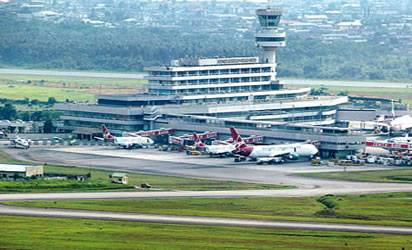
IN the history of mankind, war has brought more destruction than development but such could not be said of the aviation industry. By the end of World War II, there was more improvement to the aviation sector of the world economy. Many countries and capitals had built their own airports. Civil aviation witnessed rapid growth and development, as military aircrafts were repositioned and repurposed as passenger airlines or private jets. Since the historic flights, involving three De Havilland DH 9A aircraft belonging to the Royal Air Force, RAF that first flew Nigerian airways, the aviation industry in the country has played an important role in achieving a sustainable development not only to Kano and Maiduguri where they first landed, but to other commercial and administrative areas like Lagos, Abuja and Port Harcourt. In Nigeria, the expansion of air services is a necessary condition for development and diversification of the nation’s economy away from oil to a more diversified export based natural resources-including tourism- is very well needed in a working air transportation system that is hitch-free and driven by the private sector.
Improvement in the air transport infrastructure has a key role to play in development of tropical regions of Nigeria. Air travel is the most popular mode of travel in modern society today. Air transportation has made long distance travel a possibility and near distance in a very short period of time resulting in a market that has grown significantly. The aviation sector plays an important role in national economy by providing jobs and also contributing to the state coffer. Therefore, I want to say expressly that if this opportunity of newly introduced aviation system-Air Peace Lagos-Akure and Over land-Akure-Abuja-in Ondo State is properly harnessed, the development can boost job creation and drive economic growth through its impact on the performance of industries such as tourism, oil and gas, agriculture and mineral resources such as bitumen, limestone, kaolin and small scale medium enterprises (SMEs).
Air transport facilitates trade: it helps countries to participate in the global market by increasing access to main markets. Air transport also encourages investors to specialise in activities in which they have a comparative advantage and to trade with countries producing other goods and services. It is worth mentioning that air transport is indispensable for tourism, particularly for remote and island destinations. Tourism directly supports jobs in airlines and airports and expenses of visitors arriving by air create a substantial number of jobs in the tourism industry. As it were, the nature of tourism is to catch fun, not to spend hours travelling a long distance to tourist sites that litter the nooks and crannies of Ondo State such as the Largest golf resort in Nigeria and third in Africa situated at Ilaramokin; biggest traditional palace on the continent of Africa situated at Owo; the longest hills in Africa situated at Idanre; the unique Igbo Olodumare at Oke-igbo; the Ebomi lake; etc.
Air transportat also boosts productivity in the national economy, improves transport links and expands the market in which companies operate. By opening up markets, air services expose companies to stiffer competition, encouraging them to achieve maximum productivity with minimum effort and time factor. The aviation industry improves the efficiency of industries for mobility and delivery of products and services. It enables investment both into and out of countries and regions. It effectively networks companies located in different parts of the nation and the globe and increases the size of potential markets.
Ondo State is known to be a reservoir of natural endowments. Considering the environmental impacts of roads construction and other land transportation system like rail, air can provide alternative means for such places without tampering the reserved biodiversity zones. By conservation of protected areas, air transport improves quality of life by broadening people’s leisure and cultural experiences. It thus provides a wide choice of holiday destinations around the world and an affordable means to visit distant friends and relatives. Air transport helps to improve living standards and also can alleviate poverty, especially, through tourism. By facilitating tourism and trade, it generates economic growth, provides jobs, increases revenues from taxes, and fosters the community relationship with neighbouring states and communities. Air transport network also facilitates the delivery of emergency and humanitarian aid relief anywhere on earth, and ensures the swift delivery of medical supplies and other needs. Other jobs provided by this system include employment and activities of suppliers to the air transport industry –like jobs linked to aviation fuel suppliers; construction companies that build additional facilities; the manufacturer and supplier of goods sold in airport retail outlets, and a wide variety of activities in the business services sector including local transportation to shuttle passengers from the airport to their different destinations.
The Ondo State governor, Oluwarotimi Akeredolu’s commitment and efforts to fast-track economic revitalisation in the state through air transport is significant for tourist sites and other commercial activities in the state including productive and extractive industries. The introduction of Air Peace and Overland Airways has increased the flights frequency on the Lagos-Akure-Abuja route respectively. This enables passengers travelling from Lagos to Akure, and Akure to Abuja, Federal Capital Territory (FCT) a smooth travelling time. Neighbouring states like Ekiti, Osun and Kogi also can benefit from this development by enjoying more flight options which will enhance their business activities, and provide them with the flexibility to visit and bond with loved ones and enjoy other forms of leisure.
This giant stride of the Akeredolu’s government should be sustained to enhance the untapped tourist centres, agricultural produce like cassava, oil palm, rice, cocoa, maize, and mineral resources such as oil and gas, limestone, bitumen, kaolin; private owned institutions such as Elizade University, Ilaramokin, Achiever University, Owo, Wesley University, Ondo, neighbouring Afe Babalola University, Ado-Ekiti and other hidden wealth in the state towards jobs creation, profit maximisation and industrialisation of the Sunshine State.
Adeleye sent this piece from Lagos.
END

Be the first to comment